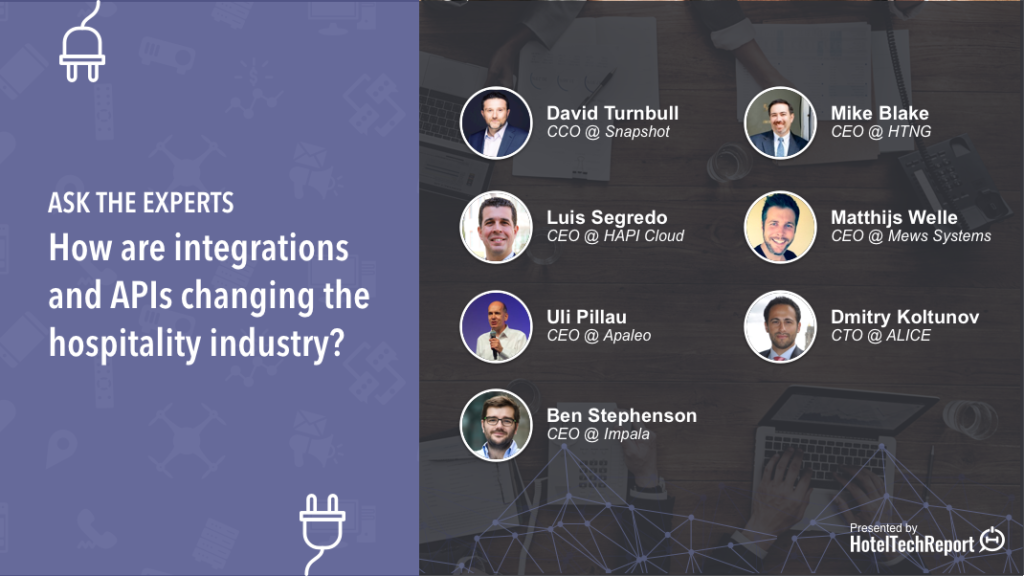
When asked about where they think the market is going in the next five years, seven leaders in travel technology—from software solutions providers t0 integrations developers—agreed that the days of closed ecosystems, siloed data, and exorbitant integration fees will soon be over. The shift to more open architectures is expected to catalyze innovation and enable hoteliers to stay competitive in an increasingly tech-driven business environment.
Below is what these seven travel technology experts have to say about the market’s future.

Luis Segredo, CEO, HAPI Cloud: “The hotel industry will be in a much happier place in five years. Forward-thinking companies are working to consolidate industry data with the aim to expose APIs that will facilitate access. It is a natural evolution for solutions like PMS that are moving to multi-tenant cloud platforms. New data platforms will also place data in the full control of hotel companies and help them be better stewards of the data they collect. This will be critical as the global community works to protect personally identifiable information in an ever more restrictive way.”
Matthijs Welle, CEO, Mews Systems: “We notice that customers today have been trained by legacy systems to think long and hard about integrations, as they come with high costs, long implementation periods, and complications. We are trying to educate the industry that with cloud solutions its really plug-and-play, and if you don’t like what you see, you unplug and move on to the next until you find your optimal mix of solutions. Once hoteliers get used to this, the sky is truly the limit, allowing to serve customers faster in a more personalized way across the platforms that customer chooses. That is true hospitality, in our opinion.”
Uli Pillau, Founder, Apaleo: “Currently, the word integrations has a negative connotation and is associated with closed legacy technology, high fees, and long wait times. This will change. In the coming years, we will move towards an open approach. Innovative property management systems will be the ones to lead the change by offering cloud-based solutions and open APIs which allow any application to connect seamlessly. It will give hotels the freedom to customize their tech stack in a way that makes the most sense for their business, and will allow hotel tech companies to focus on innovating rather than building integrations.”
Dmitry Koltunov, CTO, ALICE: “In the next 5 years, I believe that we are going to see the conversation shift from integrations into APIs. With integrations, the focus has mostly been on systems sharing data and getting a common context. With APIs, the thinking becomes much more about systems exposing capabilities for à la carte use. We will see hotels build their technology in the form of a unified platform, and leverage APIs to really get creative about their brands. The empowered hotelier will wield a portfolio of APIs to orchestrate guest and staff experiences that will present a new standard of evolved hospitality.”
Ben Stephenson, CEO, Impala: “In five years time, it will be two years since anyone has had to talk in exasperated tones about ‘integration.’ Instead, we’ll be talking about ‘connection.’ The difference? Integration is a legacy issue from an era where systems had to be physically altered at great expense to work together, necessitating hefty costs and massive upfront commercial validation. Connection, instead, is about systems working together seamlessly through specialist middleware that can be easily and inexpensively implemented by any vendor. We’ll see a lot more companies being able to work together, making happier hotel customers and more revenue all around.”
David Turnbull, CCO, Snapshot: “My personal expectation is that in five years’ time, we won’t be talking about integrations anymore as those pains of collecting and storing data will have been resolved. Not every hotel needs an enterprise in mind-designed operating software that can handle every task imaginable. So why should they pay for that? Developers will, as a result, provide hotels with more modular technology choices, allowing them to pick out the features that they want and need. Hoteliers want to do what they do best, which is to meet and exceed their customers’ expectations. Within the next five years, I forecast that hotels will only work with vendors that permit interoperability, flexibility, and open access to the data needed to power their guest experience.”
Mike Blake, CEO, HTNG: “It would be nice to have a single universal connection that will work with all applications and share data seamlessly. When data influences solution architectures, they will start to converge into a form of meaningful consensus on the best way to integrate and build robust solutions quickly. In the meantime, service bus architecture remains an easy and effective way to bring a complex ecosystem together. I also predict OpenTravel Alliance’s Schema and International Air Transport Association’s (IATA’s) New Distribution Capability (NDC) will continue to work at a higher level of collaboration so direct connections among travel providers will become more prevalent. Hotel tech life is still bumpy now but it will start to get easier.”
Read about hotel technology’s paradigm shift and the age of interconnectivity here.
About the Author
Jordan Hollander is the co-founder of hoteltechreport.com.











